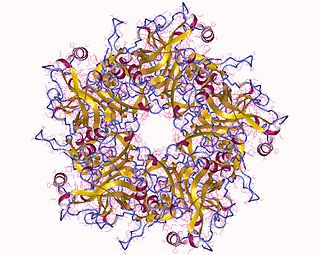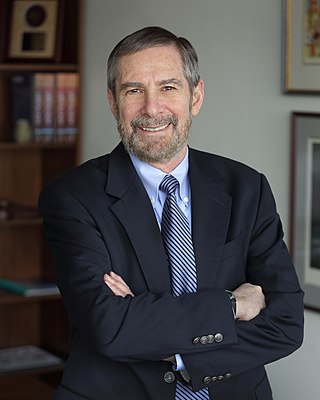Related Research Articles

Human papillomavirus infection is caused by a DNA virus from the Papillomaviridae family. Many HPV infections cause no symptoms and 90% resolve spontaneously within two years. In some cases,an HPV infection persists and results in either warts or precancerous lesions. These lesions,depending on the site affected,increase the risk of cancer of the cervix,vulva,vagina,penis,anus,mouth,tonsils,or throat. Nearly all cervical cancer is due to HPV,and two strains –HPV16 and HPV18 –account for 70% of all cases. HPV16 is responsible for almost 90% of HPV-positive oropharyngeal cancers. Between 60% and 90% of the other cancers listed above are also linked to HPV. HPV6 and HPV11 are common causes of genital warts and laryngeal papillomatosis.

Head and neck cancer is a general term encompassing multiple cancers that can develop in the head and neck region. These include cancers of the mouth,tongue,gums and lips,voice box (laryngeal),throat,salivary glands,nose and sinuses. Head and neck cancer can present a wide range of symptoms depending on where the cancer developed. These can include an ulcer in the mouth that does not heal,changes in the voice,difficulty swallowing,red or white patches in the mouth,and a neck lump.

Cervical intraepithelial neoplasia (CIN),also known as cervical dysplasia,is the abnormal growth of cells on the surface of the cervix that could potentially lead to cervical cancer. More specifically,CIN refers to the potentially precancerous transformation of cells of the cervix.

Gardasil is an HPV vaccine for use in the prevention of certain strains of human papillomavirus (HPV). It was developed by Merck &Co. High-risk human papilloma virus (hr-HPV) genital infection is the most common sexually transmitted infection among women. The HPV strains that Gardasil protects against are sexually transmitted,specifically HPV types 6,11,16 and 18. HPV types 16 and 18 cause an estimated 70% of cervical cancers,and are responsible for most HPV-induced anal,vulvar,vaginal,and penile cancer cases. HPV types 6 and 11 cause an estimated 90% of genital warts cases. HPV type 16 is responsible for almost 90% of HPV-positive oropharyngeal cancers,and the prevalence is higher in males than females. Though Gardasil does not treat existing infection,vaccination is still recommended for HPV-positive individuals,as it may protect against one or more different strains of the disease.
Charles F. Lynch is a cancer researcher,whose work has been cited 30,000 times. He is a university professor at the University of Iowa. He is director of two large multi-decade studies.
Margaret Anne Stanley,OBE FMedSc,is a British virologist and epithelial biologist. She attended the Universities of London,Bristol,and Adelaide. As of 2018,she is an Emeritus Professor of Epithelial Biology in the Department of Pathology at the University of Cambridge and a Fellow of the Academy of Medical Sciences. She is also an Honorary Fellow of the UK Royal College of Obstetricians and Gynaecologists and an honorary fellow of Christ's College,Cambridge. Stanley is a research scientist in virology focusing on the human papillomavirus (HPV). Her research work has led to new scientific findings on HPV. Additionally,she uses her expertise on HPV to serve on multiple advisory committees and journal editorial boards.

Oropharyngeal cancer,also known as oropharyngeal squamous cell carcinoma and tonsil cancer,is a disease in which abnormal cells with the potential to both grow locally and spread to other parts of the body are found in the oral cavity,in the tissue of the part of the throat (oropharynx) that includes the base of the tongue,the tonsils,the soft palate,and the walls of the pharynx.

Human papillomavirus-positive oropharyngeal cancer,is a cancer of the throat caused by the human papillomavirus type 16 virus (HPV16). In the past,cancer of the oropharynx (throat) was associated with the use of alcohol or tobacco or both,but the majority of cases are now associated with the HPV virus,acquired by having oral contact with the genitals of a person who has a genital HPV infection. Risk factors include having a large number of sexual partners,a history of oral-genital sex or anal–oral sex,having a female partner with a history of either an abnormal Pap smear or cervical dysplasia,having chronic periodontitis,and,among men,younger age at first intercourse and a history of genital warts. HPV-positive OPC is considered a separate disease from HPV-negative oropharyngeal cancer.
Edith A. Pérez is a Puerto Rican hematologist-oncologist. She is the Serene M. and Frances C. Durling Professor of Medicine at the Mayo Clinic Alix School of Medicine.

Douglas R. Lowy is the current Principal Deputy Director of the U.S. National Cancer Institute (NCI) and Chief of the Laboratory of Cellular Oncology within the Center for Cancer Research at NCI. Lowy served as Acting Director of NCI between April 2015 and October 2017 following the resignation of Harold E. Varmus,M.D.,and again between April and November 2019,while Director Norman Sharpless served as the Acting Commissioner of the U.S. Food and Drug Administration. He resumed the role of Acting Director on May 1,2022,when Sharpless stepped down until October 3,2022 when Monica Bertagnolli was appointed Director. He resumed the role again in November 2023 after Bertagnolli resigned to serve as director of the National Institutes of Health.
Maria Saveria Campo FRSE,known as Saveria,is an Italian viral oncologist,known for being the first person to demonstrate an effective papillomavirus vaccine. She developed the vaccine alongside her colleague at the University of Bristol,England,Dr. Richard B.S. Roden. She went on to be recognized for her work and was awarded the position of Fellow of the Royal Society of Edinburgh in 2006. She has worked continuously in the field of Oncology up until her retirement.
Gypsyamber D'Souza is an American epidemiologist. She is a professor of epidemiology at the Johns Hopkins Bloomberg School of Public Health. D'Souza's main focuses of research are infectious diseases,cancer prevention,and translational epidemiology. She is a principal investigator of the Multicenter AIDS Cohort Study / Women's Interagency HIV Study Combined Cohort Study (Mwccs.org).
Laurence Zitvogel is a French physician-scientist specializing in oncology and immunology. Zitvogel is a clinical oncologist,a researcher in the Laboratory of Tumor Immunology and Immunotherapy,and a professor at Paris-Saclay University. She has studied the correlation between the immune system and the success of cancer treatments for over 30 years. Her primary research experience lies in exosomes,studying the biological impact of structural abnormalities on malignant neoplasms,and anti-tumor therapy. Through her work as a professor and researcher,Zitvogel discovered that chemotherapy could delay the growth of tumors in mouse models. Her team reported the first anticancer probiotic,Enterococcus hirae. As of 2020,she is researching an effective and inexpensive diagnostic test to predict dysbiosis and is investigating the promising lead on the role of gut microbiotes in anti-tumour immunotherapy.
Lori Jo Pierce is an American radiation oncologist and 57th President of the American Society of Clinical Oncology. She is a Full Professor and Vice Provost for Academic and Faculty Affairs at the University of Michigan. Her research focuses on the use of radiotherapy in the multi-modality treatment of breast cancer,with emphasis on intensity modulated radiotherapy in node positive breast cancer,the use of radiosensitizing agents,and the outcomes of women treated with radiation for breast cancer who are carriers of a BRCA1/2 breast cancer susceptibility gene.
Beth Young Karlan is an American gynecologic oncologist. In 2008,she was named editor-in-chief of the medical journals Gynecologic Oncology and Gynecologic Oncology Reports. In 2012,Karlan was appointed by the White House to serve on the National Cancer Advisory Board,and in 2015,she was elected to the National Academy of Medicine.

Chi Van Dang is a hematological oncologist and researcher,currently serving as the Scientific Director of Ludwig Institute for Cancer Research. He is known for his research on genetics,the MYC gene and the cellular energy metabolism of cancer.
Cornelis Joseph Maria Melief is a Dutch immunologuist specialising in cancer immunology and immunotherapy,with a focus on therapeutic cancer vaccines. He is emeritus Professor,former head of the Department of Immunohematology and Blood Transfusion at the Leiden University Medical Center,and Chief Scientific Officer at ISA Therapeutics in Netherlands. He is known for his work in the field of cancer immunology,devising new cancer therapies based on the activation of the patient's own immune system.
The Oral Cancer Foundation,sometimes abbreviated to OCF,is an American,IRS-registered,501(c)(3) non-profit organization,which focuses on oral and oropharyngeal cancer related issues and public awareness of the disease.

Aimée Rebecca Kreimer is an American cancer epidemiologist who researches the etiology and prevention of human papillomavirus infection (HPV) and cancer prevention. She is a senior investigator in the infections and immunoepidemiology branch at the National Cancer Institute.
Tara Olive Henderson is an American pediatric oncologist. As the Arthur and Marian Edelstein Professor in the Department of Pediatrics,she is also the Director of the Childhood Cancer Survivor Center,Director of Survivorship at the University of Chicago Comprehensive Cancer Center,and chief of Pediatric Hematology and Oncology at the University of Chicago.
References
- 1 2 3 Piana, Ronald (September 10, 2019). "Maura L. Gillison, MD, PhD, Pioneer in HPV-Related Head and Neck Cancer, Has Often Changed Lanes in Her Career". ascopost.com. Retrieved May 28, 2021.
- ↑ "Maura L. Gillison, MD, PhD". mdanderson.org. Retrieved May 28, 2021.
- 1 2 Harris, Jason (2020). "OncLive Honors 15 Cancer Care Pioneers". onclive.com. Vol. 21/No. 19. 21. OncLive. Retrieved May 28, 2021.
- ↑ "Delta Omega 2001 Inductees". jhsph.edu. Retrieved May 28, 2021.
- ↑ D'Souza, Gypsyamber; Kreimer, Aimee R.; Viscidi, Raphael; Pawlita, Michael; Fakhry, Carole; Koch, Wayne M.; Westra, William H.; Gillison, Maura L. (May 10, 2007). "Case–Control Study of Human Papillomavirus and Oropharyngeal Cancer". New England Journal of Medicine . 356 (19): 1944–1956. doi: 10.1056/NEJMoa065497 . PMID 17494927.
- ↑ "Maura Gillison". oralcancerfoundation.org. 20 September 2016. Retrieved May 28, 2021.
- ↑ "Maura L. Gillison, MD, PhD". the-asci.org. American Society for Clinical Investigation . Retrieved May 28, 2021.
- ↑ "Gillison Lands Rosenthal Memorial Award for HPV Work in Cancer". cancer.osu.edu. 2012. Retrieved May 28, 2021.
- ↑ "Prominent National Organization Honors Prolific Ohio State Scientist Physician". cancer.osu.edu. November 8, 2016. Retrieved May 28, 2021.
- ↑ "Johns Hopkins inducts 16 new members into Society of Scholars". hub.jhu.edu. April 12, 2016. Retrieved May 28, 2021.
- ↑ "Sensei Biotherapeutics Appoints Maura Gillison, M.D., Ph.D., and Richard Ulevitch, Ph.D., to its Immuno-Oncology Advisory Board". globenewswire.com (Press release). May 5, 2021. Retrieved May 28, 2021.
- ↑ "ASCO recognizes three MD Anderson faculty with highest honors". mdanderson.org. April 22, 2021. Retrieved May 28, 2021.